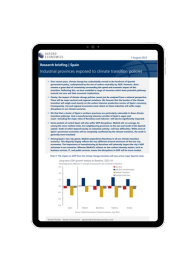Industrial provinces in Spain exposed to climate transition policies

Over recent years, climate change has undoubtedly moved to the forefront of Spanish government policy, underpinned by the aim of carbon neutrality by 2050. However, there remains a great deal of uncertainty surrounding the speed and economic impact of this transition.
What you will learn:
- Clearly, the impact of climate change policies cannot just be analysed from a national perspective. There will be major sectoral and regional variations. We forecast that the burden of the climate transition will weigh most heavily on the carbon intensive production sectors of Spain’s economy.
- We find that a cluster of Spain’s northern provinces are particularly vulnerable in these climate transition pathways.
- Some pockets of central Spain will also suffer GDP disruptions. Madrid will, on average, be among the more resilient cities, but neighbouring provinces to the east and south of the Spanish capital―both of which depend heavily on industrial activity―will face difficulties.
- Among Spain’s two city giants, Madrid outperforms Barcelona in all our climate transition scenarios. This disparity largely reflects the very different sectoral structures of the two city economies. The importance of manufacturing to Barcelona will adversely impact the city’s GDP outcomes in our scenarios.
Tags:
You may be interested in

Post
Heatwaves and headaches for Europe this summer
Destinations across the world have been faced with sustained temperatures in excess of 40C (104F) since June. The combination of climate change and the warm phase of the El Niño climate pattern is widely believed to be the cause of this.
Find Out More
Post
Europe: Nuclear energy has likely peaked, despite a new embrace
The energy crisis has provoked a fundamental rethink of nuclear energy across Europe and many governments are now committing to building new reactors or delaying phaseouts. But we estimate phaseouts will still offset new additions for some years.
Find Out More
Post
Tighter Eurozone financial conditions and rising fragmentation risks
Eurozone financial conditions have tightened abruptly since the start of the Ukraine war, supporting our caution on near-term growth. Unless the chances of a quick resolution to the conflict rise, we think conditions will remain pressured in the near term and may even tighten.
Find Out More